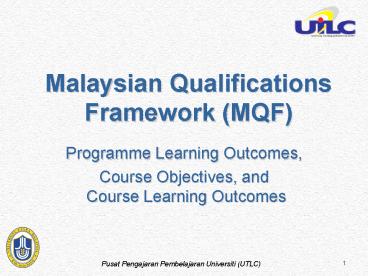Malaysian Qualifications Framework MQF - PowerPoint PPT Presentation
1 / 25
Title:
Malaysian Qualifications Framework MQF
Description:
An instrument that develops and classifies qualifications based on a set of ... calibrate, construct, dismantle, display, fasten, fix, heat, manipulate, measure, ... – PowerPoint PPT presentation
Number of Views:160
Avg rating:3.0/5.0
Title: Malaysian Qualifications Framework MQF
1
Malaysian Qualifications Framework (MQF)
- Programme Learning Outcomes,
- Course Objectives, and Course Learning Outcomes
2
List of Facilitators
- COB
- Assoc. Prof. Dr. Nurahimah Mohd Yusoff
- Assoc. Prof. Dr. Abdul Malek Abdul Karim
- Mr. Ramly Mohd. Ali
3
List of Facilitators
- CAS
- Assoc. Prof. Dr. Ahmad Jelani Shaari
- Dr. Razamin Ramli
- Dr. Hasani Dali
4
List of Facilitators
- COLGIS
- Dr. Hamida Beebi Abdul Karim
- Assoc. Prof. Dr. Mohd Izam Ghazali
- Dr. Ruzlan Md. Ali
5
What is MQF?
- An instrument that develops and classifies
qualifications based on a set of criteria that
are approved nationally and at par with
international practices, and which clarifies the
earned academic levels and credit system,
learning outcomes of study areas based on student
learning time (SLT).
6
MQF Proposed Minimum Credit
7
Learning Outcome Domains
8
Student Learning Time (SLT)
- The notion of SLT
- the time required by a student to understand the
syllabus or curriculum content and to fulfill the
registration requirements to complete a study
programme - Inclusive of all learning time components
- official contact time guided learning time
self-study time assessment time
9
Student Learning Time (SLT)
- Credit the measurement of student academic load
Measurement 40 notional hours 1 credit
The quantitative measure of all learning
activities
Lecture, tutorial, practical, revision,
self-study, research, discussion,
coursework/assignments, assessments and
preparation for assessments, co-curriculum
Student Learning Time (SLT)
10
Student Learning Time (SLT) Cont.
- Credit value of a course is the
- Face to Face / Guided Learning Time
- Student Self Learning Time
- Total Assessment Time
11
Student Learning Time (SLT) Cont.
- Changing from Lecturer-Centred to Student-Centred
Unaccounted for in the present system
12
Programme Objectives
- General statements about what graduates are
expected to achieve upon completion of the
programme - Fewer than Programme Learning Outcomes (PLO)
13
Programme Learning Outcomes (PLO)
- What graduates of particular programmes will
know and be able to do as a result of learning
experiences upon completion of the programme.
14
Course Objective vs. Course Learning Outcomes
Course Objective
Course Learning Outcome
- What THE STUDENTS are be able to do (specific) at
the end of instruction
- What THE TEACHER expects students to know and be
able to do (as a whole) at the end of instruction
- They are specific learning objectives
- should be developed along with a specification of
the learning experiences that will allow the
outcomes to be achieved.
- General in nature NOT as specific as outcomes
- NOT behavioral in nature
- Verbs Know, Understand
- One course objective may generate several
learning outcomes
- Stated in behavioral terms
- Verbs Identify, Discuss, Evaluate
- Objectives are intended results or consequences
of instruction, curricula, programmes, or
activities.
- Several learning outcomes are derived from one
course objective
- Outcomes are achieved results or consequences of
what was learned evidence that some learning
took place.
15
Course Learning Outcomes
- Course learning outcomes should flow from a needs
assessment - The needs assessment should determine the gap
between an existing condition and a desired
condition - They represent the solution to the identified
need or issue - Statements which describe a desired condition,
i.e. the knowledge, skills or attitudes needed to
fulfill the need - Usually expressed in terms of Blooms domain
16
Benefits of Course Learning Outcomes (Cont.)
- Provide direction in the planning of a learning
activity - They help to
- Focus on learners behavior that is to be changed
- Serve as guidelines for content, instruction and
evaluation - Identify specifically what should be learned
- Convey to learners exactly what is to be
accomplished
17
Characteristics of Good Course Learning Outcomes
- Do-able can the behavior be performed?
- Observable can it be observed or can it be seen
to take place? - Measurable can it be evaluated? Level of
achievement - Assessable what method can be used to evaluate
it? Instrument or tool
18
Blooms Cognitive Domain
Simple
Complex
19
Affective Domain
- Includes the manner in which we deal with things
emotionally, such as feelings, values,
appreciation, enthusiasm, motivation and
attitudes. - Is divided into 5 major categories, given below
starting with the simplest form to the most
complex - Mastery of one leads to the other.
20
Affective Domain (Cont.)
Simple
Complex
21
Psychomotor Domain
- Includes physical movement, coordination and use
of motor skill areas which is developed through
practice and measured by speed, precision,
distance, procedure or execution techniques. - Is divided into 7 major categories starting with
the simplest form to the most complex. - Mastery of one leads to the other.
22
Psychomotor Domain (Cont.)
Simple
Complex
23
Guide to Writing Course Learning Outcomes
- What are the most essential things students need
to know and be able to do? - What specific skills or strategies do students
need? - What are the most important things they need to
be able to do when they finish? - How do these apply in the job market?
- Are these what employers want?
- Should the students level of awareness be
raised? - Are there things students need to unlearn?
24
Guide to Writing Course Learning Outcomes (Cont.)
25
Examples































